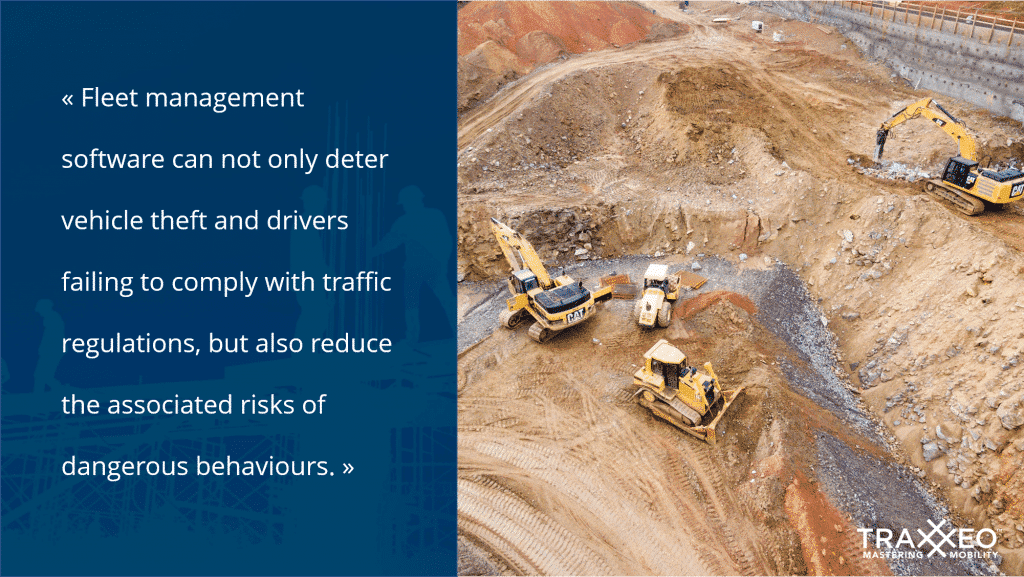
Construction projects are often large-scale operations, involving many different resources. Among these, fleet assets are both crucial and expensive. To run a profitable business, it is vital for a construction companyadobe to have a strong fleet management strategy. The vehicles must be at the right location, at the right time and in a good condition. In addition, a good fleet management strategy can help to control the related costs.
However, fleet management is not always straightforward as it includes a wide variety of complex tasks, for which collecting and analysing data can be problematic. Fortunately, there are many ways that fleet management software can now help with these tasks, which will contribute towards improving the productivity and competitiveness of the company.
Fleet management – a wide range of responsibilities
Fleet management is defined as the process used to supervise and control all fleet and related asset information, from acquisition to disposal. This enables a company to reduce costs and associated risks, improve efficiency, and ensure compliance across the entire fleet operation.
Within this process, fleet managers have a wide range of responsibilities, including:
- Managing the purchasing or renting of vehicles
- Supervising vehicle maintenance
- Registering and licensing all vehicles under their management
- Developing a strategy to reduce fuel consumption and costs
- Developing strategies to cut other associated costs and optimise the fleet’s efficiency
- Assisting with the recruitment of drivers
- Ensuring that drivers follow the driving regulations and also any company-specific rules
- Providing detailed reports on vehicle usage, inspections and maintenance
- Finding ways to optimise the fleet’s lifespan
So, these responsibilities clearly cover some very disparate areas, such as strategic planning, cost control, optimisation of data collection, recruitment and vehicle maintenance. And to complicate matters further, fleet managers can also encounter specific difficulties related to the role, particularly in the construction sector.
Difficulties encountered in fleet management
Managing mobile resources, such as vehicles, can be challenging in any environment. But this is even more so in the construction sector where these vehicles are used on a variety of worksites, by a variety of workers. As a result, collecting on-site data, for example, can be a real headache.
The most common difficulties encountered in fleet management are:
- Vehicle/equipment location – Where is the equipment? Is it at the right place? Or in the case of a vehicle being needed on a jobsite, which vehicle is the closest to it? Where are all the rented vehicles?
- Vehicle use – Who is using it, where and when? What is the usage rate of the internal and external fleets? Which vehicles are never/rarely used?
- Driver monitoring – Are the standard rules and limits being followed by the drivers? (e.g. speed limits, maximum number of working days/hours, etc) Do all the drivers have their paperwork in order?
- Vehicle condition – Which vehicles are out of use at the moment? Which ones need maintenance? And how can the fleet maintenance programme be organised?
- Cost control – How much does it cost to run the fleet? How can the running costs be reduced?
Software solutions for fleet management
Each fleet management task has its own challenges. Overall, however, collecting the relevant data on time is difficult, but this is clearly a vital requirement for successful fleet management. Fortunately, specialised software can assist and empower construction fleet managers, particularly related to four of their main responsibilities.
1. Supervision – Provide an overall view of operations
Supervision is a key activity for a fleet manager. But it can be a real headache to get a view of all operations at the same time – this is where fleet management software can help as it can provide a clear overview of all your operations, in real time. Additionally, it can also provide:
- The history of events regarding the use of a vehicle: who did what and when with the vehicle, when was the vehicle running or stopped, etc
- Precise tracking of mileage and the hours of use, using geolocation software
- A follow-up of the assignment: who was in charge, for which project and on which construction site
Having this kind of information is crucial for good fleet management. An overall view enables the fleet manager to react quickly and smartly, in dispatching vehicles as efficiently as possible, for example.

2. Security – Improved safety
The fleet manager is also responsible for securing the fleet. This directly leads to the need for real-time information, which is impossible without digital technology. Fleet management software provides data about the location of a vehicle in real time, or the speed at which it is being driven at any given moment.
By using this information, abuse of the fleet and unwanted behaviour can be eliminated. Fleet management software can not only deter vehicle theft and drivers failing to comply with traffic regulations, but also reduce the associated risks of dangerous behaviours. By making sure that the rules and regulations are being followed, you secure your vehicles and also your drivers.
3. Reacting – Get information on time
Collecting the data is not the end of the process, however – it also needs analysing, interpreting and acting upon. Fleet-related information enables managers to take quicker and smarter decisions, and in the construction sector, reactivity is the key for efficiency. But, traditional methods of handling fleet data mean that it isn’t always easy to get this information on time and it can be even harder to analyse it to identify any problems.
Fleet management software can collect and structure the data, to give you information in real time. It is also possible to set up a wide range of automatic alerts, such as when:
- a worker is not following the driving regulations
- a vehicle is being used outside of working hours, or away from a worksite
- a vehicle has broken down or is in need of maintenance
This enables you to take immediate and well-informed actions, to keep control of your fleet and minimise its running costs.
4. Planning – More information for better decisions
Good information not only enables you to react quickly, but it can also help you to be better organised for the future. Planning is a crucial activity for fleet managers: forecasting the need for new vehicles, planning their purchase/rent and, of course, the need for maintenance.
Specialised software gives you precise information for better planning of your likely needs in the future. Are there any unused vehicles in the fleet, for example? Are more vehicles really needed? Which vehicles are being used the most and which are the most efficient?
Furthermore, this software is a fantastic tool for optimising your fleet’s maintenance. By standardising the maintenance according to a vehicle’s mileage or hours of use, for example, you can be sure your planning is efficient, optimising the lifespan of your vehicles and avoiding unexpected breakdowns, which can delay a construction project or even be a source of hazards.
Besides, better information enables you to better plan your routes, to avoid unnecessary mileage and therefore reduce CO2 emissions and fuel costs.
In general, good planning of resources reduces costs, in a healthy and sustainable way.
Choosing the right fleet management software: solutions for each budget
Fleet management software can really empower fleet managers, to enable them to take care of all their responsibilities in a more efficient way. But when the time comes to invest in the right software, what should drive your decision?
The main criteria should be your needs and therefore your budget. Do you have a large or small fleet to manage? Are you only concerned with the individual assignment of a vehicle or do you need a global overview of the use of all vehicles? Do you need detailed information, at any time?
For each situation, you can find an adapted solution, with adapted costs. At Traxxeo, we make every effort to ensure that we can provide fleet management software for all different needs and budgets, such as:
- A digital timesheet solution is easy to put in place and can provide information about the vehicle’s assignment, location, time of use and driver’s identity. For smaller budgets and simpler needs, this option can be the perfect match.
- Track and trace solutions need the vehicles to be equipped with a tracking system. Obviously, this is a more significant initial investment, as it fulfils a greater need. This solution enables you to keep track of all relevant information, in real time. However, with a fleet of a certain size, this investment can quickly pay for itself, as running costs are reduced and the fleet’s efficiency is increased.
Regardless of your needs and budget, there is suitable fleet management software available to empower you as a fleet manager. It will help to make this multi-tasking job much less of a headache, as you improve your work efficiency and take better informed decisions.